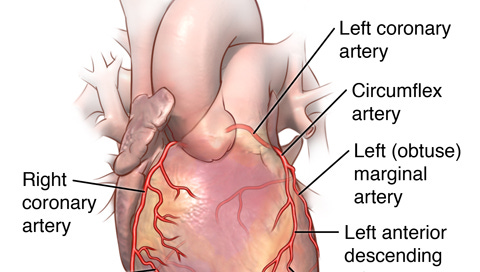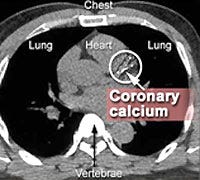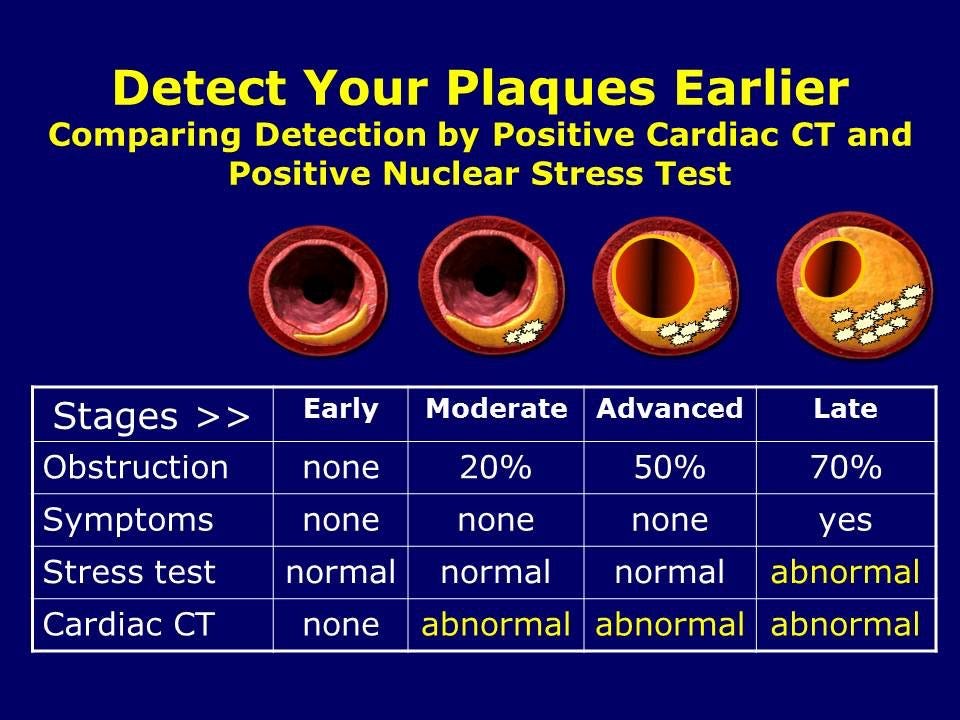Coronary Artery Calcium Score
Non-invasive Heart Test to Look at Your Arteries
Introduction
Coronary artery disease is the cause of heart attacks.
The question is, how can we check out your arteries health EARLY to see if you may be at risk of a heart attack?
Your coronary arteries are the vessels that supply oxygen-rich blood to the heart. Plaque — made of cholesterol, calcium and other substances — can build up and narrow or close the arteries.
Coronary artery plaque = Atherosclerosis = Ateriosclerosis = Coronary Artery Disease
There are three major coronary arteries a bunch of smaller side branches. The major vessels are: Left main coronary artery which splits into your left anterior descending (LAD) and circumflex (Cx) arteries and then on the other side of your heart is the right coronary artery (RCA).
We have a few ways we can check the health of these arteries:
Coronary artery calicum score (Cardiac CT): a non-invasive test that can detect very early cholesterol build up in your arteries
Stress test: a non-invasive test that can only detect MAJOR blockages in your heart arteries- more than 70% blockage *See graph below
Cardiac catheterization (angiogram): an invasive test that is the ultimate test to look at all the details of your arteries
Dr. Lacey and I love to evaluate your heart arteries early and non-invasively. This is why the Coronary Artery Calcium (CAC) Test is so helpful.
This non-invasive CT scan (computed tomography) of the heart calculates the amount of calcified plaque in the coronary arteries.
Hardening of the Arteries
I think of cholesterol in your arteries as “soft and gooey”. Overtime your body tries to protect you by hardening that soft plaque. It’s called “hardening of the arteries” for a reason. Your body dumps calium into the soft plaque to make it more stable and less likely to rupture causing a heart attack.
The coronary calcium scan is a better predictor of coronary events than cholesterol screening or other risk factor assessments.
About Your CAC Score
This test gives you a score, a Coronary Artery Calcium Score. A calcium score is calculated based on the amount of plaque that has hardened observed in the CT scan.
Your likelihood of having a heart attack directly correlates with your calcium scoring. The lower your calcium score, the less likely you are to have a cardiac event compared to other men or women your age.
Calcium Score Results
If you have any plaque present (a score greater than 0), this means you already have “junk” building up in your arteries and we are going to be aggressive in treating you so this plaque does not progress.
We will be aggressive with lifestyle changes, such as quitting smoking, eating better and exercising more. We are also going to have a long chat about aggressive cholesterol lowering with medications- such as statins.
Zero: No plaque. Your risk of heart attack is low. Woot! This is great news. Keep up the good lifesyle.
1 - 10: Small amount of plaque. Your risk of heart attack is low in the short term.
11-100: Some plaque. You have mild heart disease and a moderate chance of heart attack.
101 - 400: Moderate amount of plaque. You have heart disease and plaque may be blocking an artery. Your chance of having a heart attack is moderate to high.
Over 400: Large amount of plaque. In this zone, you have fairly advanced coronary artery disease. Most cardiologists will check a stress test if your numbers are this high to make sure your heart is getting enough blood flow during stress/exercise.
This next two graphs help spell out your 10 year risk of events based on your calcium score.
What Happens During a CT Heart Scan
The procedure is performed by a CT technologist and takes a whopping 15 minutes or so (some of the newer scanners can do this teste in SECONDS).
You will lie on your back on the CT table and EKG electrodes will be placed on your chest to monitor your heart rate. The CT table will move in very small increments every few seconds and take pictures.
You may be asked to hold your breath for 20 to 30 seconds, and you will need to hold perfectly still. Even though you will be left alone in the room, the technologist will watch you through a window, and you will be able to speak to him or her.
The scan takes approximately 20-30 seconds, but from start to finish it takes approximately 10-15 minutes.
PLEASE NOTE: Most insurance companies are not willing to pay for this test! It is absolutely unbelievable to us. You should expect to PAY ~ $150-400 depending on where you live. We believe it is money well spent to understand your heart attack risk.
Conclusion
The coronary artery calcium scan is a quick, easy, low risk and non-invasive heart test that can check the health of your arteries earlier than any other test we have.
We are huge fans of this test- for the right patients.
Check with your doc to see if this scan might be right for you.









